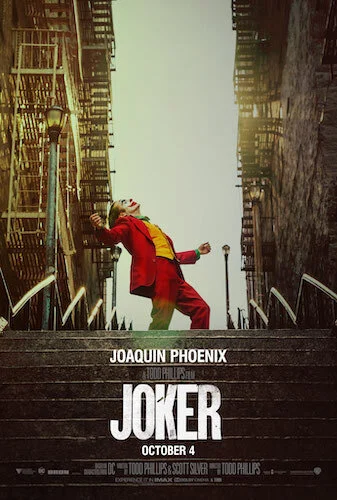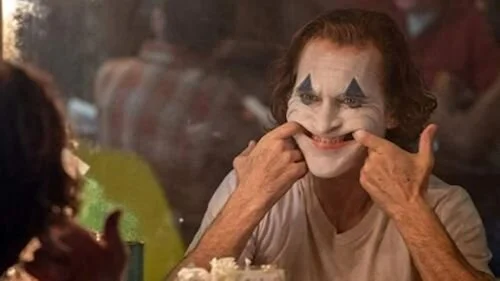Joker
Oh, Joker. Joker, Joker, Joker. We have a film like this every once in a while (maybe even annually), where parts of the film scream “film of the year”, and other parts are savagely underwhelming or misguided. The biggest issue is that Todd Phillips’ take on this pop culture icon does not know if it wants to be a typical origin story, a political thriller, or an actual dark dive into the mind of Arthur Fleck (the man that ultimately takes on the Joker persona). Had the film stuck to one of these identities, here’s how it would play out. The straight up origin story route would be tired but cohesive. The political thriller angle may have been more thought provoking than it thinks it is. The psychological drama would have been off the charts. The glimpses of this kind of film are harrowing. Nauseating. Jaw dropping. The blending of all three purposes renders Joker conflicted, and not in a “well the Joker’s an anarchist, so so what?” kind of way.
The main reasons to watch this film? First, and most obviously, Joaquin Phoenix is a tour-de-force with the greatest performance of the year thus far. When the film crumbles, he holds the shattered pieces on his malnourished and gaunt back. When the film succeeds, he takes advantage of this and sends shivers down your spine. However wayward the screenplay and flow may be, Phoenix always knows how to better each moment. How to make you truly invested. You’re curious or terrified at all times. Whatever blasé plot devices hinder the film are saved by Phoenix’s ability to turn any trope into something meaningful. The film’s titled after the lead character, and Phoenix’s Joker does not disappoint. The Oscar should already have his name on it, but you never know how the awards race is going to go.
Secondly, the score by Icelandic composer Hildur Guðnadóttir is the extra oomph so many scenes required. Her cello plays such deep chords, that you will feel uneasy the entire time. The film will break character and toss in out-of-place pop songs every once in a while (ask Todd Phillips, I can’t see the merit there either), but resorting back to Guðnadóttir’s score will always feel like a huge relief; this is ironic, because her score is so maddening too. Lastly, Lawrence Sher steps outside of his comfort zone and delivers the best photographical work of his career. The grit that sands down the streets of Gotham city adds some realism; a contrast to Sher’s ability to make Joker’s make up leap off his face (and into his colourful, yet bleak, surroundings). These two aesthetic feats may make you question if the film is actually better than you initially thought. It likely isn’t, though.
Arthur Fleck putting on his best smile.
SPOILERS
Then there’s the screenplay, which flashes moments of strength, but is usually bogged down by Phillps’ confusion between a pulsating beat, and the comedic timing of his previous works. In Hangover, you can get away with some out-there stuff happening, because it’s in the timing. Logic takes a backseat (hopefully not for too long). In Joker, way too much goes on that simply doesn’t cut it if you’re trying to turn this film into something artsy or mentally stimulating. Here’s the laundry list of “Things that Just Didn’t Work in Joker”.
1) How in the hell was Arthur Fleck not a suspect within microseconds? His former coworkers are literally discussing the subway murders, and the masked suspect, and then go into how Fleck got fired for having a loaded gun during a shift (as a clown) literally the same day of the murders. How. Did. This. Not. Escalate. Sooner?
2) I love Zazie Beetz as an actress, and she does a great job here. However, the character of Sophie was absolutely redundant, and — I’ll say it — useless to the story. You can argue “the only person who loved Arthur was a figment of his imagination”, but you can play that off in much better ways. Plus, who the hell didn’t see this twist coming? At all?
3) Did no one notice Arthur’s mother being killed? Maybe not during the act, but afterwards? I think an argument can be made that the theme of the film is “the poor people of Gotham aren’t cared about”, so a blind eye can be turned, and proper equipment or care isn’t used. However, I’d assume doctors or nurses could sense some sort of foul play took place, reflect on when Arthur last visited, and put two and two together. Nope.
4) So, a whole movement takes place throughout the city because a poor guy killed three rich elite members of society? That’s all it took? I get that Gotham’s in a terrible shape, but good God. Wouldn’t it have made more sense if these people were protesting something that happened against them? Yeah, they are: poverty and the lack of society’s help. However, this was spawned by a poorer citizen killing the rich. Okay… I guess? Well, it’s convenient, at least.
5) There are way too many lazy entrances and exists of characters. The detectives that stumble across Arthur in the streets (don’t give me that “they’re following him” garbage, because the film can still play it off a little bit better than it does). Gary is left alive and free to leave, but that doesn’t get the ball moving on Arthur’s arrest any sooner? That’s a freaking witness! Arthur has enough time to fix his makeup and prepare for his television debut, and nothing happens. Nothing. How?!
Speaking of the television spot, that’s probably the best part of the film. All of the film boils down to these sickening moments. This is when Joker realizes how Taxi Driver works. Appropriately, it’s Robert De Niro (as talk show host Murray Franklin) that ushers in the budding cinematic controversial anti-hero here. Every nonsensical, silly element of Joker caters to this specific scene. Every single one. This scene benefits from everything: the build up, the pacing, and Phoenix’s horrifying monologue (this part alone screams “give him the God damn Oscar!”). Joker was worth seeing for Phoenix, but it was also at least worth waiting until this disturbing and twisted moment. It’s graphic, but it’s the kind of power Phillips assumed his entire film contained.
But we have the ending, which confuses all of the previously mentioned identities (origin, politics, and psychoanalysis) in a pretty baffling way. So, Bruce Wayne’s parents being murdered was because of the Joker inspired riots? I think a craftier director could have pulled this off. Here, it seems phoned in. What’s exactly being said, anyway? The lower classes will revolt blindly? Had Joker himself been a political terrorist in a blatant way, that would make more sense. Instead, let’s not forget, all of this was because someone (the Joker) killed three rich playboys. So, this went all the way to “sure, let’s assassinate Thomas Wayne and his wife”? Seriously? All of Gotham’s championing Joker, once he is found, as well. I get that that’s the crowd he always wanted, but that simply doesn’t work if you’re trying to make a debatable discussion as well. In Taxi Driver, Travis Bickle’s ethics get sent into a super grey area. He did bad things, but was trying to help people he thought were in danger. Joker has no idea what it’s trying to say, and it makes for a very bitter aftertaste.
END OF SPOILERS
The Joker being birthed.
Phillips was clearly trying to make this generation’s Taxi Driver, but he clearly missed out on why that film succeeded. It started off relatively sane, slowly crept into darker and darker avenues, and arrived at the taboo and shocking ending it’s known for. Joker tries to pull off that climax from very early on, and with multiple attempts. If this is an actual downfall, let’s experience it together. Having Arthur’s past slowly get pieced together in the present doesn’t quite work out. Joker simply tries to do too much, and it becomes a tangled mess. Oddly enough, I would still deem the film an experience of sorts.
Once again, you have Joaquin Phoenix to thank, in a performance that transcends the material from whence it came. I’d argue his performance makes the film worthy of many revisits. Joker is a legitimate effort, but Todd Phillips may have to figure out how dramatic features work better if he intends on abandoning comedy films because of woke culture (his words, not mine). For instance, none of the violence — no matter how graphic — feels gratuitous (weirdly enough), but not all of it feels earned (for a film like this, anyway). A cinema is playing two films at the end: The Mask of Zorro (the biggest influence on the concept of Batman) and Blow Out (a Brian De Palma film birthed by the New Hollywood movement). This is obviously a two-way homage, but it’s clear evidence that Joker is more split than it is a genre bender. There’s something daring here, but it’s lodged deep within all of the excess gunk.
Andreas Babiolakis has a Masters degree in Film and Photography Preservation and Collections management from Ryerson University, as well as a Bachelors degree in Cinema Studies from York University. His favourite times of year are the Criterion Collection flash sales and the annual Toronto International Film Festival.






